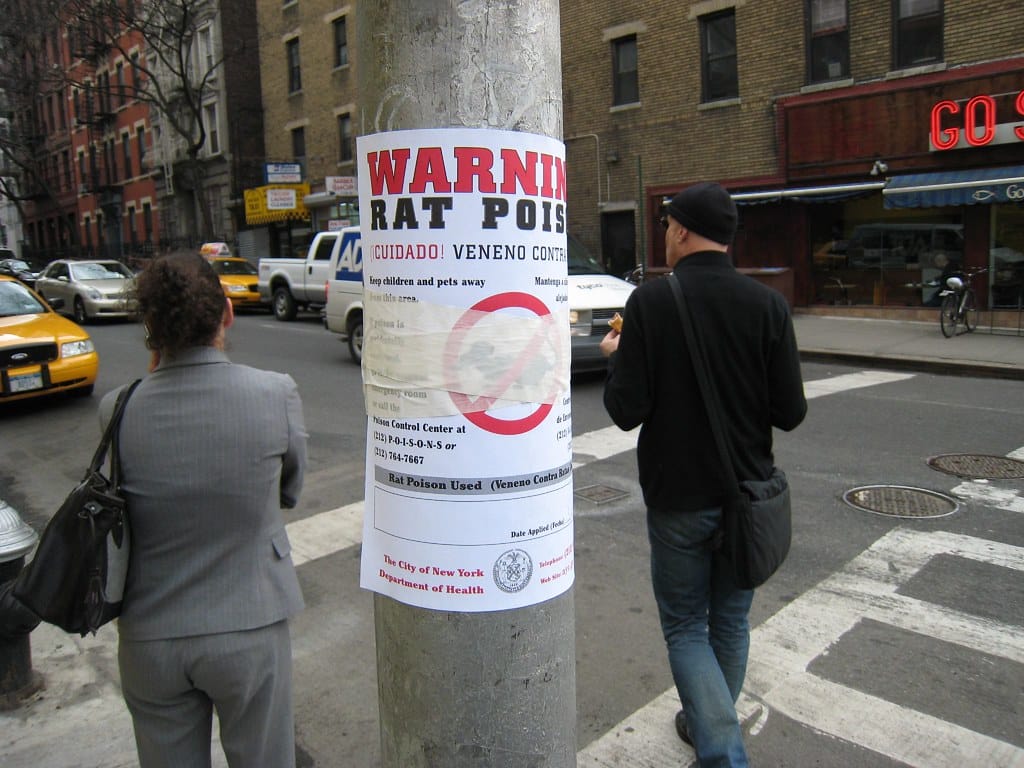Key Takeaways:
- Rat poison tends to be seen as a tasty treat by our canine companions, so make sure to keep it well out of reach.
- 4 broad types of rat poison commercially available in the USA in 2022.
- Immediately call your veterinarian and the dog Poison Helpline to determine how much your dog has eaten and their risk
If you suspect your pooch has eaten rat poison, then contact your DVM and the Dog Poison Helpline at (855) 764 7661 or their website at www.dogpoisonhelpline.com immediately.
Unfortunately, in my clinic, I see a few cases of rat poison ingestion each year, particularly around the fall and winter seasons when these furry critters are on the hunt for cozier sleeping quarters.
Also known as rodenticides, these commonly used products are specifically formulated to kill rodents – rats and mice.
Understandably, the toxic chemicals in these products are highly dangerous to our fur babies. Rat poison is formulated to be highly palatable to attract rodents. These products are also seen as tasty snacks by many pooches.
Delicious but deadly, these products cause internal bleeding, organ failure, and even death.
Read on for our comprehensive article helping you to know exactly what to do if your precious pup gets access to rat poison.
What types of rat poison are there?
There are a few different types of rat poison, and they all have different mechanisms of action depending on their active poison:
- Anticoagulant: Possibly the most common type of rat poison on the market. These poisons prevent blood clots from forming and can cause internal bleeding once eaten.
- Cholecalciferol: These poisons contain vitamin D3, leading to acute and severe kidney failure and death.
- Bromethalin: Poisons containing bromethalin cause swelling of the brain and spinal cord. Within just 4 hours, convulsions, hyperthermia, grand mal seizures, and death can occur.
- Zinc, magnesium, and Aluminium phosphides: Zinc phosphide is the more commonly used form and causes a rapid release of phosphine gas into the stomach when it comes into contact with stomach acid. Phosphine gas is highly corrosive and toxic.
- Alpha-chloralose: Not currently available in the USA, this anesthetic compound causes central nervous system effects, including tremors, seizures, incoordination, and coma. Unlike other rodenticides, with supportive care, the prognosis for survival is favorable with alpha-chloralose poisoning.
There are four broad types of rat poison currently available in the USA, with a fifth type available in Europe. The clinical signs vary with the type of poison ingested, but of all, the phosphides are potentially the most toxic for the people treating an affected pooch.
How much rat poison is toxic to dogs?
The amount of rat poison that causes toxic effects in pooches depends on the type of rodenticide and whether it’s eaten directly or indirectly. Sometimes our canine companions are poisoned through indirect exposure from eating a rodent that has already been poisoned.
- Anticoagulant: For first-generation anticoagulants such as warfarin, just 20mg/kg can be fatal for some dogs, while second-generation anticoagulants (brodifacoum, diphacinone, or pindone) as little as 0.2mg/kg can be toxic. Second-generation anti-coagulant poisons are actually more toxic with small repeated doses.
- Cholecalciferol: Toxic signs may be seen with doses as small as 0.1mg/kg though lethal doses are usually higher, around 13mg/kg.
- Bromethalin: The lethal dose of bromethalin-containing rat poisons can be as little as 3mg/kg, while lower doses can result in paralytic syndrome in pooches.
- Zinc, magnesium, and aluminum phosphides: While the lethal dose of phosphides has been reported as 20mg/kg, just 1/10 of this is toxic, requiring care and potentially causing harm to humans handling their dog’s vomit.
- Alpha-chloralose: Potentially the safest form of rodenticide for our furbabies, the lethal dose is considered 100mg/kg. The risk of indirect poisoning (eating a poisoned animal) with alpha-chloralose is considered by the EU as negligible.
The lethal dose of rat poison varies depending on the type of poison ingested but the cholecalciferol type (0.1mg/kg) and anti-coagulant type (0.2mg/kg) only require tiny amounts to cause clinical signs of toxicity.
What to do if my dog ate rat poison?
A general rule for dogs having eaten rat poison is to contact your emergency veterinary service and the dog Poison Helpline immediately.
Poisoning is a genuine emergency, and you shouldn’t wait until tomorrow before taking your dog to be seen.
Your veterinarian will ask questions to help determine the best course of action, so you should make a note of the following:
- Dog’s Weight
- Time of Exposure
- Brand Name & Manufacturer of poison
- Active Ingredient and Concentration of poison
- Package Size
- How Much Gone from Pack
Contact dog Poison Helpline Don’t forget to bring the packaging with you to your dog’s appointment.
When to see a vet?
Immediately! In fact, the sooner you have your dog assessed and treatment started, the better their prognosis for survival and long-term health.
In the immediate term, after your dog has ingested a poison or a poisoned rodent, your veterinarian MAY advise inducing vomiting or administering activated charcoal.
It’s important to know what type of poison your dog has had access to as the phosphide poisons are also toxic to humans when exposed to the phosphine gas in your dog’s vomit. DON’T INDUCE VOMITING unless advised by your veterinarian.
Make an appointment with your veterinarian as soon as possible and call the dog Poison Helpline on (855) 764 7661 or their website at www.dogpoisonhelpline.com. Your veterinarian and the helpline will help you determine how much your dog has eaten and their risk.
What if my dog ate plenty of rat poison but seems fine?
If your fur baby eats rat poison of any type, they will most likely seem normal for at least a couple of hours or even days afterward, but that doesn’t mean that they don’t need treatment.
Symptoms and their onset will vary depending on the type of poison your dog has ingested:
- Anticoagulant: These poisons mechanistically inhibit the recycling and production of Vitamin K1, which is essential for clotting but indications of this take between 2-5 days after ingestion, with clinical signs of bleeding not seen for 3-7 days after your fur baby eats a toxic dose of this poison.
- Cholecalciferol: Disrupting the normal balance of calcium and phosphorus, cholecalciferol is metabolized in the liver and kidneys to a more active form, calcitriol. The concentration of calcitriol peaks 48-96 hours after your dog has eaten the poison, so clinical signs take 12-48 hours to manifest.
- Bromethalin: Rapidly absorbed, bromethalin is rapidly absorbed and metabolized, and signs can start showing within 4 hours, though it may also take up to 7 days.
- Zinc, magnesium, and Aluminium phosphides: Due to the rapid release of phosphine gas, clinical signs can occur within just minutes of ingestion though rarely, they can take up to 24 hours. In severe cases, death can occur within just 5 hours.
- Alpha-chloralose: Not currently available in the USA. The prognosis for survival for dogs that ingest this type of rodenticide is favorable.
Don’t be lulled into a false sense of security if your dog doesn’t show signs of toxicity immediately after eating rat poison. The active ingredient takes time to be absorbed and metabolized so you should see treatment as soon as possible to prevent the onset of clinical signs from even occurring.
Signs that my dog ate rat poison
The clinical signs of rat poisoning vary depending on the type of poison your dog has eaten so we’ve broken it down in this section to help you know what to watch out for.
Anticoagulant
- Loss of apdogite
- Lethargy
- Weakness
- Nose bleeds
- Blood in feces or urine
Cholecalciferol
- Weakness
- Loss of apdogite
- Vomiting
- Increased drinking
- Increased urination
Bromethalin
- Weakness
- Hind limb paralysis
- Tremors
- Seizures
Zinc, magnesium, and Aluminium phosphides
- Lethargy
- Severe vomiting +/- blood
- Incoordination
- Tremors
- Seizures
- Shock
- Death
Alpha-chloralose
- Depression/Excitability
- Tremors
- Seizures
- Increased salivation
- Incoordination
- Coma
The clinical signs vary with the type of poison, but if you see signs of gastrointestinal distress, loss of apdogite, and any central nervous system signs (depression, seizures, etc), or increased thirst and urination, then you should consider that your dog may have eaten some rat poison.
What happens to dogs that eat rat poison?
Rodent poisons are formulated to be tasty to their target creatures, and thus they’re also seen as such by our canine companions too.
The exact symptoms experienced by dogs that have eaten poison will depend on the type of rodenticide ingested, but they invariably lead to death if left untreated.
Why is rat poison toxic to dogs?
Rat poison is designed to kill rodents, and as they’re also mammals, the toxic effects are similar for our canine sidekicks.
While the clinical signs differ, the basic premise of most poisons is to cause multi-organ failure and eventually lead to the death of the animal that ate either the poison or an already poisoned animal.
How do vets treat rat poisoning?
Treatment will vary depending on the type of rat poison eaten, but we’ve broken it down for you here.
Anticoagulant
If eaten within 4 hours of presenting to your veterinarian, vomiting will be induced, possibly followed by administration of activated charcoal. Your veterinarian will also start administering a vitamin K1 antidote. Vitamin K may need to be administered for up to 4 weeks depending on the anticoagulant involved.
Cholecalciferol
If your vet sees your dog within 4 hours of ingestion, then they will induce vomiting and follow that with activated charcoal. A dog showing clinical signs will also need supportive and targeted therapy, including fluid therapy and hospitalization.
Bromethalin
As with other poisons, your veterinarian will induce vomiting if eaten within 4 hours and follow this with activated charcoal. Some specialized treatment will also be needed if there are clinical signs such as seizures or tremors.
Zinc, magnesium, and Aluminium phosphides
DO NOT INDUCE vomiting. Bring your dog to your DVM immediately in a well-ventilated vehicle. Your veterinarian will provide supportive care for your dog immediately.
Alpha-chloralose
Not currently available in the USA, treatment is supportive, including fluids, inducing emesis, and administering activated charcoal.
Treatment varies depending on the type of poison eaten. If the poison was eaten in a short period before being seen by your DVM, then your veterinarian will induce emesis and administer activated charcoal. Further treatments will be guided by the amount and type of poison ingested.
The Final Woof
With rat poisoning, no one size fits all. Broadly, there are 5 categories or types, though only 4 of them are currently available for commercial use in the USA.
Arguably the most common are the anticoagulant and cholecalciferol types. Both types can take a couple of days before clinical signs are seen, but treatment should be instigated as soon as possible to give your pooch the best prognosis for survival and organ health.
If you suspect your pooch has eaten rat poison, then contact your DVM and the dog Poison Helpline at (855) 764 7661 or their website at www.dogpoisonhelpline.com immediately.


